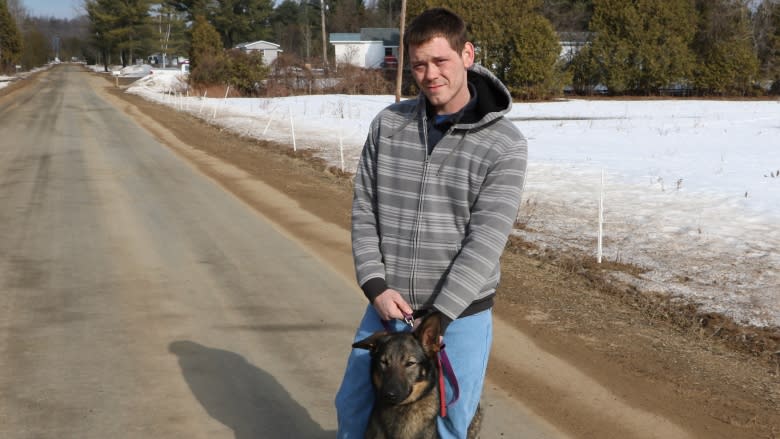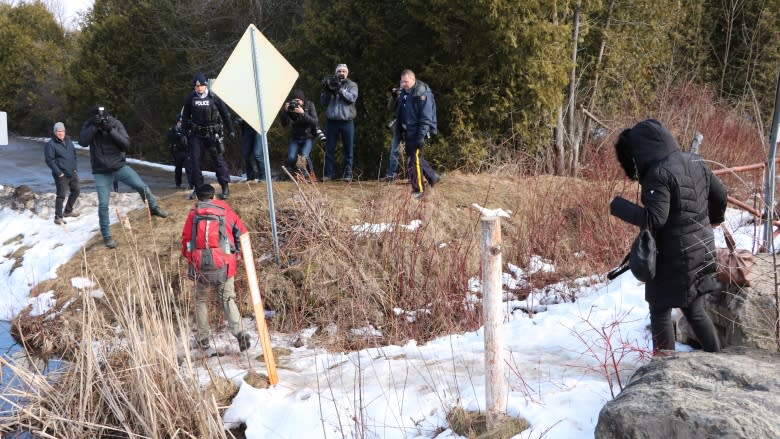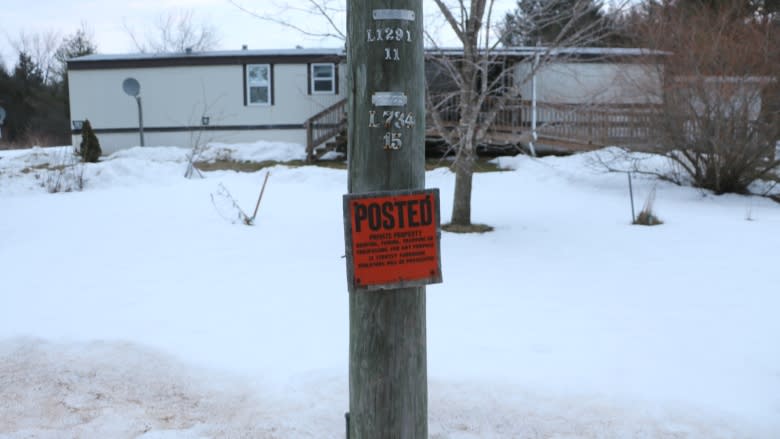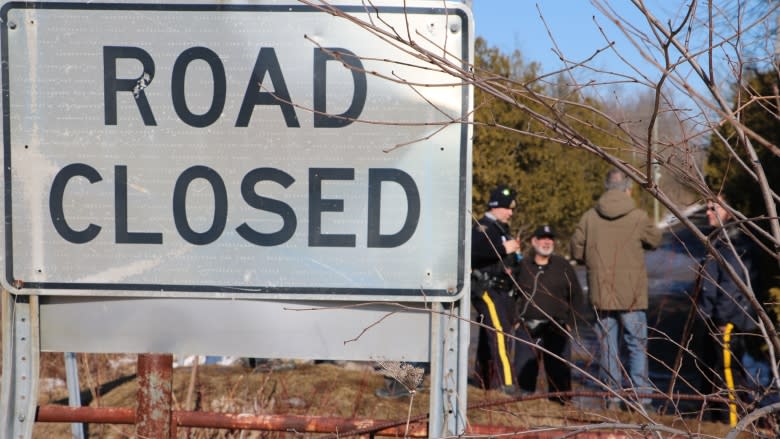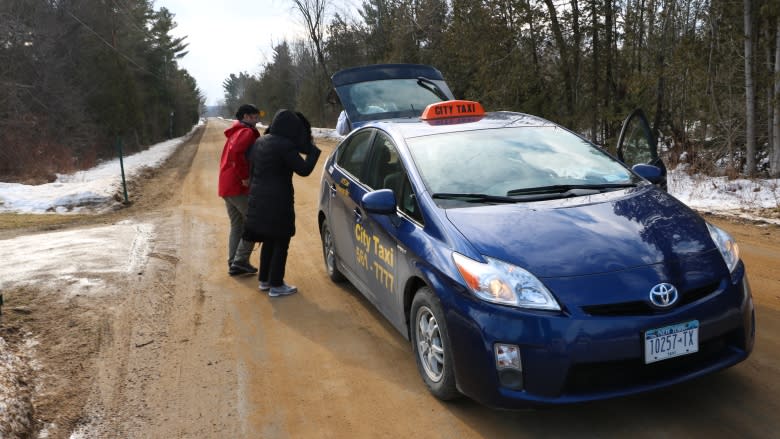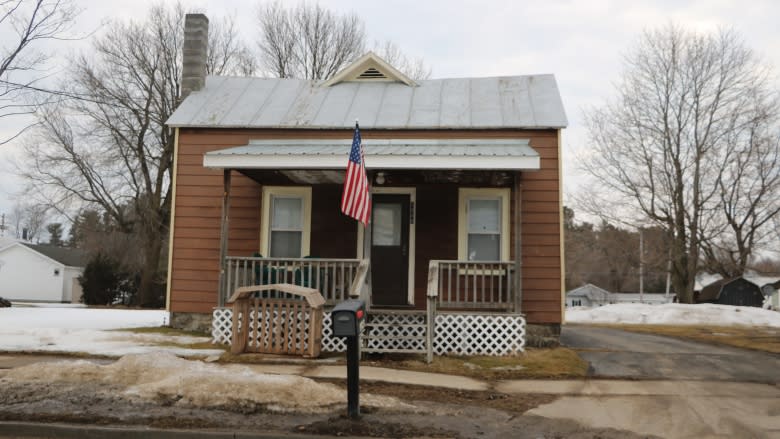'Why do they want to leave?': Life on the Quebec border in Trump's America
The search lights flooding his windows, the helicopters overhead, the woman who knocked on his door late one night asking how to get to Canada — it has all become too much for Tim Lamb.
The 25-year-old, who lives in Champlain, N.Y., within a few hundred metres of the border, decided to get a German shepherd to help him feel safe.
But if this keeps up, he says, he may need to move.
"It's nerve-racking. It really sucks because it has such a nice yard," said Lamb, who relies on disability coverage to afford his one-room, $700-a-month trailer.
Lamb is among the residents whose quiet lives have been upended by the recent surge in illegal crossings into Quebec.
In January, 452 people claimed asylum at the Quebec border — a 230 per cent increase from the same month a year earlier. Experts attribute the increase to the political climate under U.S. President Donald Trump.
Many of those crossings have taken place at the end of Lamb's street, Roxham Road, even though the official port of entry in Lacolle, Que., is only a 15-minute drive away.
On a daily basis over the past month, parents pushing strollers and couples clutching backpacks pull up in taxis at the end of the dirt road, lined by trailers and pickup trucks.
The spectacle — often captured by photographers and TV camera crews, as U.S. border patrol officers watch from a distance — has spawned a mix of consternation and confusion among those who live nearby.
The Canadian gateway
For migrants unnerved by Trump's America, Roxham Road is the gateway that allows them another chance at securing asylum status in North America.
Crossing into Canada illegally allows them to avoid the constrictions of the Safe Third Country Agreement, under which asylum seekers who have landed in either country are denied a chance to seek refuge in the other at official entry points.
The pact was signed in 2002, in the wake of the Sept. 11, with the aim of strengthening North American security while keeping trade and commerce flowing freely across the border.
Recently, asylum seekers have come from Syria, Eritrea, Sudan, Yemen, Iraq and beyond.
They arrive at Roxham Road after crossing thousands of kilometres by bus, plane and foot.
A collection of boarding passes, torn up and tossed into the mud a few metres from the border, detail a dizzying journey from Los Angeles to Chicago to Boston to Plattsburgh, N.Y., about 30 kilometres south of Champlain.
A more common route involves taking a Greyhound from New York City to Plattsburgh. A gas station there with a Mini-Mart and a Dunkin' Donuts is the last stop before the border on a bus route bound for Montreal.
A cab ride from the Greyhound stop to Roxham Road can cost between $40 and $50 US.
Christian Gaudet, a dispatcher for City Taxi in Plattsburgh, says he routinely gets calls from the bus station or hotels around town requesting a trip to the border.
Last Wednesday alone, 19 people walked across the muddy pathway that divides the two countries, an RCMP officer at the border said.
Five more — a family of three from Turkey, and a married couple from Myanmar and Turkey — arrived Thursday morning in separate taxis.
When asked why they were fleeing the United States, the Turkish man walking with his wife replied simply, "because it's not safe," after handing two $20 bills to the driver.
'It shouldn't be that f---ing easy'
In another trailer a few doors down from Lamb, Gino Ramirez is taking a wrench to an oil barrel that he plans to convert into a barbecue for cooking chicken and deer.
Ramirez, a veteran of both the Iraq and Afghanistan wars, lives with his twin three-year-old boys.
He suspects many people are leaving because of Trump. But he doesn't have much sympathy for them.
"In my eyes, if you're not legal, you should be doing something to get legal," said Ramirez, whose grandparents immigrated to the U.S. from Mexico.
Ramirez believes the government should build a border wall on the Canadian side — or at least increase patrols — to make it more difficult to cross in either direction.
"It shouldn't be that f--king easy," he said, quickly pointing out that he's not worried for his own safety. "I have a bunch of guns in the house if I need them."
The number of people crossing into Canada is nothing like the influx seen in Europe and elsewhere, where thousands are living in refugee camps after fleeing violence in the Middle East.
Canadian officials say there have been similar increases in asylum claims in the past because of policy shifts in the U.S., Canada or abroad.
But the recent increase has, for some Americans living near the border, changed the way they see their northern neighbours.
"You guys treat them good, you give them a place to live, don't you?" said Harold Gonyo, 61, referring to Canada's handling of refugees.
Gonyo, who has lived at the corner of Roxham Road for 30 years, said it "has always been hot spot" for illegal border crossings.
But he, too, has noticed an increase in the past month. More than once, he's seen a van pull into his driveway; a family will scramble out, then head toward Canada.
More recently, he said, marked taxis drive asylum seekers right to the border line.
Straddling the line in Trump country
Compared to Emerson, Man., where asylum seekers from the U.S. have to walk for hours across a barren landscape, often in brutal cold, crossing at Roxham Road is far shorter and less arduous.
But Roxham Road isn't the only spot around Champlain where it is easy for asylum seekers to cross illegally.
The area is filled with quiet country roads that end at the border line, like the one where Calvin Allen, a retired roofer, has lived for three decades.
Over the years, Allen has come across clothing, an abandoned car and even financial documents with a Florida address in the forested area by his home.
Last week, he spotted footprints going into Canada, but otherwise he hasn't noticed a huge increase in clandestine crossings.
Despite the array of options when it comes to crossing into Canada, asylum seekers appear to prefer Roxham Road
It is close to the bus station and the public road goes right up to the border line, where RCMP officers stand guard. After all, they need to be arrested in order to exploit the loophole in the Safe Third Country Agreement.
Like the majority of voters in upper New York state, Allen supported Trump, explaining that he detests Hillary Clinton.
"We're all sick of the politicians," he said.
When asked why he thought some people were trying to leave the U.S., Allen said, "I've never been an immigrant, so I'm not sure what it's like."
Lamb, out walking with Cocoa, the German shepherd he claimed from the pound, seemed particularly mystified by the situation unfolding on Roxham Road.
One night, not long ago, a woman turned up at his door asking for help, but he couldn't understand what she was saying. "I couldn't even read her passport," he said.
"Why do they want to leave? Where are they coming from? Why don't they want to stay and try to find a job? It's all so strange."

